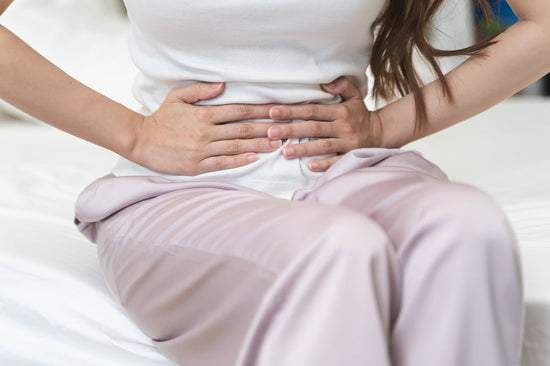You have never heard of PCOS Syndrome heard? Then you are certainly not alone. Although it is one of the most common hormonal disorders that can occur in menstruating women of childbearing age, most people have a big question mark in their head when they hear the word PCO syndrome or PCOS But we at Taynie want to change that today with a new blog post and provide a platform for the topic of PCOS. So be sure to stay tuned if you want to know more about PCOS, its symptoms, treatment options and the connection with a possible desire to have children.
What is PCOS?
Have you just stumbled upon the term PCOS and didn't really know what to do with it? Don't worry, we'll enlighten you!
Let us first take a closer look at what PCO actually means. The term PCOS Syndrome is an abbreviation for the polycystic ovary syndrome Yes, admittedly there are terms that are much more straightforward. So let's try to take a closer look at the individual parts of the word. The word polycystic comes from the fact that in PCOS various blisters appear in the tissue, which are also known as cysts. In technical terms, ovaries are also known as ovaries. This explanation of the word will probably help you understand a little better what polycystic ovary syndrome is.
Now we would like to explain to you in more detail what is behind the PCOS syndrome. PCOS syndrome is a disease that can affect menstruating people of childbearing age. In short: This disease is a Hormonal disorder . To be more precise, this disease is caused by a disorder of the ovaries' function. In terms of age, it can be said that menstruating women between the ages of 20 and 30 can develop PCOS.
Find the right Taynie for you.Discover our diversity!
4 Types of PCOS
Did you know that there are four different main types of PCOS? The symptoms and treatment can vary. Let's take a closer look at these:
Insulin resistance
Polycystic ovary syndrome in combination with insulin resistance can lead to increased insulin and androgen levels. This type of PCOS is associated with a risk of type 2 diabetes and obesity.
Normal insulin levels
There is actually a form of PCOS in which insulin levels are normal and androgen levels are low. In this case, PCO syndrome is characterized by fewer symptoms and fertility is more intact than in other variants of PCOS. This means that the desire to have children is also more likely.
Chronic inflammation
PCOS can also be characterized by chronic inflammation.This causes various symptoms such as hair loss, acne or weight gain. When people talk about PCOS, these are probably the most common complaints that people have in mind when they think of this disease.
Stopping the pill
Did you know that PCOS can occur after stopping taking the pill? The reason for this? When you stop using a hormonal contraceptive method, your body is confronted with a rapid drop in hormones - and all sorts of symptoms can become noticeable.
Are you about to stop taking the pill and want to learn more about the so-called post-pill syndrome? Don’t worry, we at Taynie have here created a blog post about it. Stopping the pill may involve looking for an alternative method of contraception. Should it be hormone-free? Then you will find out here some information you should know about hormone-free contraception.
How do I know that I have PCOS?
Are you wondering how you can tell if you might be suffering from PCOS? In this case, we at Taynie have listed the most common PCOS complaints listed:
The menstrual bleeding is irregular or absent. By the way, if you want to know more about irregular bleeding or the absence of a period, then we recommend you take a look at our Blog post in addition.
Hair loss in the form of a receding hairline or baldness.
Increased hair growth that can be noticeable on the chin, cheeks, chest, stomach, back and thighs.
Obesity
Acne and/or oily skin
A dark skin discoloration that may appear on the neck, back of the neck, armpits, or under the breasts.
infertility
A visit to your gynecologist's office can give you certainty as to whether your symptoms could be related to PCOS. An ultrasound examination of the ovaries can be performed, for example, and the status of the hormones can be determined by taking a blood sample. There you can also get advice about a Treatment Get advice.
Can I suddenly get PCOS?
You may be wondering why this hormonal disorder occurs in the first place. Unfortunately, we have to disappoint you at this point, because it is still unclear what exactly can be considered the trigger for this disease. However, there are some factors that are suspected to be responsible for triggering PCOS. These include, for example, a genetic predisposition, but also a connection with body weight. Did you know that 80 percent of all people affected by PCOS have problems with their weight? At this point you may be wondering why there is actually a connection between these two things. In fact, being overweight can cause the "male" sex hormones are produced in excess.
How is PCOS treated?
Unfortunately, PCOS is not curable, but there is a glimmer of hope, because a suitable Treatment can actually help keep the symptoms under control.A treatment tailored to your needs can also be carried out as part of a gynecological examination.
Did you know that sport can have a positive effect on alleviating PCOS? Exercise is not only positive for weight regulation, but also for fertility. Even moderate exercise can have a positive effect on hormone levels and insulin sensitivity. So go for a relaxing walk in the fresh air!
But not only exercise, but also a balanced diet can be a real help for PCOS. That's why we're now going to take a look at a few dos and don'ts when it comes to diet and PCOS.
What should I not eat if I have PCOS?
In fact, you can use your Nutrition achieve a regulation of hormones. While you should eliminate white flour and sweets from your diet, you can eat fruit, vegetables, whole grain products and linseed. Try to eat as little processed food as possible, especially fried foods. Fried animal products in particular should be avoided. Instead, make sure you eat a nutrient-rich diet. Fiber, vitamins and minerals are the be-all and end-all here.
Can I get pregnant if I have PCOS?
PCOS = infertility ? It is actually true that PCOS can be a common reason why pregnancy is not possible and the desire to have children remains unfulfilled. The hormonal imbalance in PCOS leads to an overproduction of androgens, which then causes not only ovulation but the entire cycle to be disrupted. However, we can give you a brief answer in advance, because the diagnosis of PCOS does not necessarily mean that pregnancy is impossible. Not all those affected by the disease are affected by infertility.
So let’s take a look at what could help you to achieve your goals despite PCOS. Desire to have children to fulfill.
Desire to have children despite PCOS
It can be particularly helpful if you take a closer look at your ovulation and cycle. Because if you know when you have your fertile
As we have already explained to you, some people with PCOS can be attributed to being overweight.The combination of PCOS and excess weight can lead to those affected no longer having regular ovulation and missing their period for a long time. This can be particularly stressful if you want to have a child. But ovulating at all and doing so regularly is essential to making pregnancy possible. Would you like to find out more about the phenomenon of missing your period? Then take a look here Please see our blog post about it.
We have already explained to you above that exercise can also have a positive effect on fertility. But not only exercise is an absolute winner, but also the regulation of stress. Because did you know that stress can really mess up your hormone levels and cycle? This is of course extremely bad for your fertility. But don't worry, because you are not helpless against stress! We at Taynie recommend that you take a look at our Blog post on the subject of stress and its effects on the menstrual cycle. There you will not only find out exciting facts about the subject, but also helpful tips to say goodbye to stress. Because the desire to have children and stress do not mix well. Stress often goes hand in hand with a lack of sleep. This is also undesirable, because a lack of sleep can lead to an imbalance in your hormones. Another fact: did you know that a lack of sleep can even increase the risk of insulin resistance? The effects of a lack of sleep on the body are pretty frightening, aren't they?








